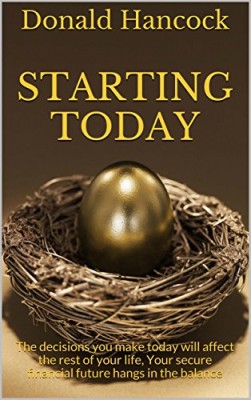The subject of my book is something that I am very passionate about, mostly because of my own failure in following what it suggests we all should do. This is one of the biggest regrets in my life! Also I am very afraid that as a country we are heading toward another financial crisis that may be even worse than the last, as a result of too much debt, both personal and as a country, along with not nearly enough savings.
My hope in writing this book is to inspire and encourage everyone, but especially the young to start saving and investing for their future today! Please do not make the same mistakes I have made.
About 10 years ago I realized I was getting up in age and really had not given much thought to how I was going to get by financially in retirement. Basically all my life I had just been living day to day, dealing with life’s issues as they came along. I would spend money on the usual necessities of life but I would also spend money on unnecessary things, which at the time I suppose I must have thought I really needed. When I think back now I really have no idea where a lot of the money I earned went to, which is sad. I have been very blessed in my life to have had pretty good paying jobs most of my life, I’m not saying that I was rolling in money but most of my life I felt pretty comfortable financially. Looking back now though it sickens me to think of how much better prepared I would be for my retirement if I had only put some of that money away, especially if I had started saving from an early age.
I have also realized that I am not the only person that is in this position. Statistics show that as a country the U.S. lags far behind many other countries when it comes to personal savings. The average U.S. personal saving rate (as a percentage of income) over the last few years has hovered around 5% and for millennials (age 35 and below) it is even worse at -1.8%, which means they are spending more than they bring in!
As a result today there are many people who are nearing retirement who just are not prepared financially and will struggle in their old age. I believe strongly that much more needs to be done in our school systems when it comes to financial education, to educate our young about the advantages of saving for their future from an early age and to promote financial discipline along with proper debt management. I worry for all those who will needlessly suffer in their old age and be forced to work just to afford the basic necessities of life. I believe that almost everyone can save a little money every month, no matter how small over your lifetime it will add up and you will be in far better shape than if you never saved at all. So please plan ahead, hopefully while you are still young and not make the same mistakes I and many others in this country have made. I worry that the outlook for many in their old age will be grim. Please make a plan for your financial future starting today.

Book Preview
Why you should begin saving from an early age
When it comes to saving and investing one of the biggest advantages that you can have is “TIME”. In my opinion time is the single most important factor in determining the ultimate size of your savings and investments. To maximize this advantage you need to start saving and investing as soon as possible. The earlier you start the larger that advantage will be. By starting at an early age you fully capture the miracle of compounding which I will talk more about in a later chapter.
The following hypothetical example illustrates the importance of saving and investing from an early age, it also illustrates the power of compounding;
We have two investors, Sally and Bob.
Our first investor Sally is wise and decides at the age of 25 that she needs to start saving for her retirement so she starts investing $300 per month into a diversified all-world index fund. She continues to invest the same amount each month until the age of 65.
Over the 40 years she has invested a total of $144,000 and the value of her fund is $770,000 (this assumes an average annual return of 6.9% over the 40 years).
Our other investor Bob like a lot of people didn’t start thinking about his retirement until he was 40, when he realized time was flying by and he had nothing saved for his retirement.
So at the age of 40 Bob decides to start investing into the same diversified all-world index fund as Sally did. But Bob knows he is way behind so he decides to invest $750 per month into the fund and also continues until the age of 65.
Over the 25 years Bob has invested a total of $225,000 and the value of his fund is $598,025.
So Sally who started investing early invested $81,000 less than Bob but ended up with $171,975 more in her retirement fund when they both reached the age of 65.
Now this result is with Sally starting at age 25, if she had started at 18 or 20 her results would have been even more impressive.
I will keep repeating this over and over, the earlier you start saving and investing the better off you will be financially later in life.
Here is another hypothetical example: Say you contributed $5000 per year to a 401K for 10 years – assume your investment earned 8 percent a year and all of the investment earnings were reinvested back into your account. Look at the difference it makes when you start investing. You would see wildly different amounts at age 65 when you retire.
* If you started saving at age 25 and stopped at 35, when you retire at 65 your $50,000 investment would have grown to $787,000.
* If you waited to start saving until age 35 and stopped at 45, when you retire at 65 your $50,000 investment would have grown to $364,000.
* If you waited to start saving until age 45 and stopped at 55, when you retire at 65 your $50,000 investment would have grown to only $170,000.
* If you waited to start saving until age 55 and stopped at 65 when you retire your $50,000 investment would have grown to only $78,000.
These examples assume that you only invest $5000 a year for 10 years and then stop. If you were to contribute that amount from the age of 25 until you retire at 65 your account would be worth more than 1.35 million dollars.
And these estimates do not even factor in employer-matching contributions which would make your account grow even larger and faster. All of these examples show how important it is to start saving and investing from an early age.
I know that when you first start saving it can be very boring. It may seem like it takes forever for your savings balance to grow, but through a combination of disciplined saving along with investing a portion of your savings as time passes you will see your balance increase exponentially which can be very exciting.
The best way to ensure that you reach financial independence is to spend less than you bring in (live beneath your means) and save the difference. I know that seems like a really simple concept but it is not always easy to do.
However with practice and dedication it can be done and that doesn’t mean you have to make huge sacrifices you just need to really be mindful of what you are spending your money on and adjust your spending habits accordingly.
Instead of buying a new car every couple of years keep the car you have a few years longer. Before you make a home purchase think about what you really need in a home. If you do decide to purchase a home think about buying something that will fit well into your budget, perhaps a home that is a little smaller. You always want to make sure that even with a mortgage payment you will still be able to put money into your savings on a regular basis.
You also should consider studying the housing market first to determine if housing prices are unusually elevated which would make the purchase a bad investment. Before deciding to make a home purchase think about whether it would make more sense financially to rent instead.
Studies have shown that most wealthy people are not rich because they make an enormous amount of money, it is because they spend less than they make and they save and invest the difference. There are numerous examples of people who have large incomes or have won huge amounts of money only to end up in financial ruin because they spent more every year than their income brought in.
What we are talking about here is something very important; we are talking about your financial security. Besides ensuring a financially secure retirement if you start saving at an early age you can achieve financial freedom at a relatively early age. You will be free to make lifestyle choices which you never will be able to make if you are living paycheck to paycheck.
If you start early you will put yourself in a position where if you choose to you can retire at a very early age while still in good health. Another benefit will be the reduction of stress that you can experience from having financial problems.
An important part of the puzzle is to also invest a portion of your savings into an IRA, Roth IRA or open a brokerage account and invest in Index or
mutual funds. Personally I would prefer a mutual fund that pays out dividends which can then be automatically reinvested.
To reap the most benefit from your investments, the sooner you start the better off you will be. The idea is to maximize the amount of time your investments have to compound.
An investor’s age also influences the amount of risk he or she can withstand. Young people, with years of earning ahead of them, can afford to take on more risk in their investment activities.
If you are young you can build a more aggressive portfolio that will be subject to more volatility but that stands to produce larger gains. Young investors can withstand the increased risk in their investing because they have the time needed to recover from any losses or investing mistakes they may make.
When you start investing at an early age you also have the time needed to learn from both successes and failures. Because investing has a fairly lengthy learning curve, young investors are at an advantage due to the fact that they have years to study the markets and refine their investing strategies.
On the other hand most individuals nearing retirement age will gravitate towards low-risk or risk-free investments, such as bonds and certificates of deposit (CDs), because they do not have the benefit of time to recover from setbacks. Also their expected returns on their investments will be smaller.
So now the big question you must ask yourself is what kind of financial future do you want?
Will you live paycheck to paycheck for the rest of your life? Will you allow debt and wasted spending control your quality of life? What kind of retirement will you have? Will you be forced to work well into your old age (if you can even find a job) because social security will not be enough to cover your basic needs? Will social security even exist when you get to retirement age?
Or!
Will you have a comfortable secure financial future? Will you have a future where you will have achieved a measure of financial freedom? Will you have a future where you are free to make lifestyle choices as you wish and not because you are forced to due to debt or lack of savings? Will you have a future where in retirement you can choose to work because you want to not because you have to?
There are some people who like to stay busy and enjoy working while others would rather travel and relax. If you start planning now for your financial future you will be free to make that choice for yourself.
All you need to do is make the decision to start today. As I have said before I believe it is one of the most important decisions you will make in your lifetime. It is a decision that will have a major impact on your life either positively if you choose the path of financial discipline or negatively if you instead choose to be financially reckless.
The sooner you start saving the better off you will be financially the rest of your life. I can never repeat that enough. Ideally you will start saving for retirement as soon as you begin your working life.
Also the sooner you start the longer you will have to let compounding work in your favor. If you can do this and stick with it throughout your lifetime financially you will be far ahead of most people. It’s also never too late to start saving for your retirement, you just have to start!
If you could only remember three things from this book I would want you to remember the following; Save as aggressively as you can; Spend your money cautiously and allow your investments to compound as long as possible.














